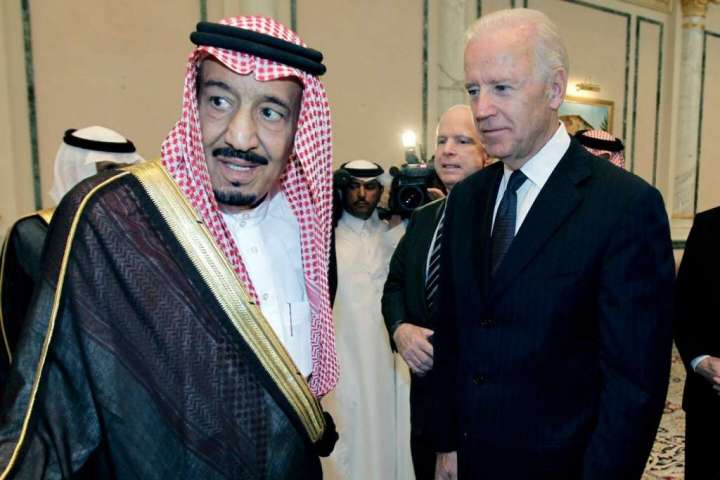Say what you will about former president Donald Trump: When he was flip-flopping on Saudi Arabia, at least he acknowledged the utterly transactional nature of it.
Biden’s flip-flop on Saudi Arabia

Administration officials confirmed Thursday that Biden plans to make a trip to Saudi Arabia later this month. The addition of the stop on Biden’s trip comes in an apparent effort to seek help from the oil-rich nation, among others, to lower the record-high gas prices that have hampered the American economy and dogged Biden’s political fortunes.
But it also comes less than three years after Biden pledged to turn the kingdom into a “pariah” for the gruesome assassination of Washington Post columnist Jamal Khashoggi. Biden is expected to meet with the country’s de facto leader, Crown Prince Mohammed bin Salman, despite U.S. intelligence having said Mohammed ordered Khashoggi’s assassination.
Needless to say, this not a treatment generally reserved for pariahs.
It’s a remarkable turnabout for Biden. At a late 2019 Democratic presidential debate, he not only promised to turn Saudi Arabia into a “pariah,” but he added that there is “very little social redeeming value in the present government in Saudi Arabia.”
Biden did little to follow up on that promise after assuming the presidency, though he did release intelligence related to the sordid affair. As early as a March 2021 interview with ABC News, he signaled the coming retreat from his campaign promise.
“We held accountable all the people in that organization, but not the crown prince,” Biden said. “Because we have never — that I’m aware of, when we have an alliance with a country — gone to the acting head of state and punished that person and ostracized him.”
Biden, it seems, has now recognized the value in the present government of Saudi Arabia — the economic and geopolitical value, if not social. While he said Friday that there were no firm plans to travel there, he did seem to pre-spin it as being geared more toward Middle East peace than oil, and he reasserted his emphasis on human rights.
“I’m not going to change my view on human rights,” he assured. “But it’s my job as president to try to bring about peace, if I can. And that’s what I’m going to do.”
Certainly, if this were truly all about peace, that would be an easier argument to make for engaging with a “pariah” state. But early indications are that this is likely to be plenty geared toward domestic economic and political considerations.
And if that is indeed a big part of the aim, it would be merely the latest example of the Saudis capitalizing on their leverage and usefulness to escape accountability — despite high-minded promises by our presidents and would-be presidents.
If there’s one recent president who talked the toughest on Saudi Arabia before coming to power, it was Trump. He had spent decades holding up the Saudis as the embodiment of the United States cozying up to ne’er-do-well allies of convenience rather than standing on our principles. But he quickly reversed course early in his presidency, turning solicitous of the Saudis in the name of forging deals. Then, upon Khashoggi’s assassination in 2018, he offered a string of bizarre comments lending credence to Saudi denials (despite the U.S. intelligence) and essentially acknowledging the real reason for not holding the kingdom fully to account: that what was on the table in terms of the alliance and weapons deals was simply more important to him. Now Trump’s son-in-law, Jared Kushner, has secured $2 billion in investment from the Saudis for his private equity firm.
Which, points for honesty. At least Trump was effectively willing to concede he valued those things more than human rights — that the balancing act tilted in that direction, despite the gruesome killing of someone who resided in his own country.
President Barack Obama, too, had to strike this balance. He generally held a harder line on the Saudis than other recent presidents. He called them “so-called” allies and alienated them by trying to work with Iran. But even he saw himself forced to compromise somewhat, especially late in his presidency with a trip to shore up relations and his veto of a bill that would have allowed the families of 9/11 victims to sue the Saudis.
Then there was John F. Kerry, who unsuccessfully sought the presidency as a Democrat in 2004. While doing so, he, too, tried to make getting tough on the Saudis a wedge issue against George W. Bush.
And in a sign of how little the fundamentals of our relationship have changed, the crux of the matter was a deal with the Saudis to lower oil prices.
“If we are serious about energy independence, then we can finally be serious about confronting the role of Saudi Arabia in financing and providing ideological support of al-Qaeda and other terrorist groups,” Kerry said.
Kerry added: “To put it simply: We will not do business as usual with Saudi Arabia.”
But the Saudis weren’t worried. As one high-ranking Saudi diplomat told The Post’s Glenn Kessler in response to Kerry’s threats, “That ends as soon as the new president gets his first security briefing.”
Nearly two decades later, despite even more high-minded promises to truly cease relying upon the Saudis, it appears it’s going nowhere. Yes, geopolitical realities make that difficult. But those are realities that a former chairman of the Senate Foreign Relations Committee like Biden would have been well familiar with in 2019.






